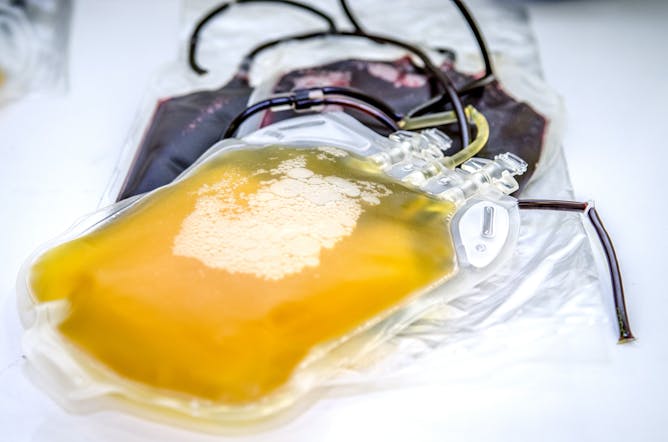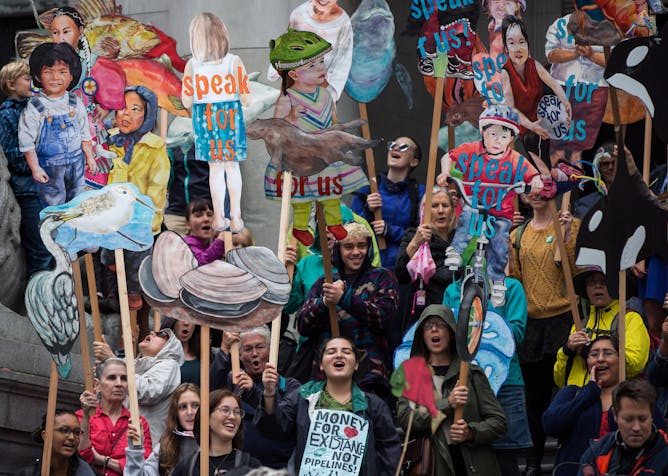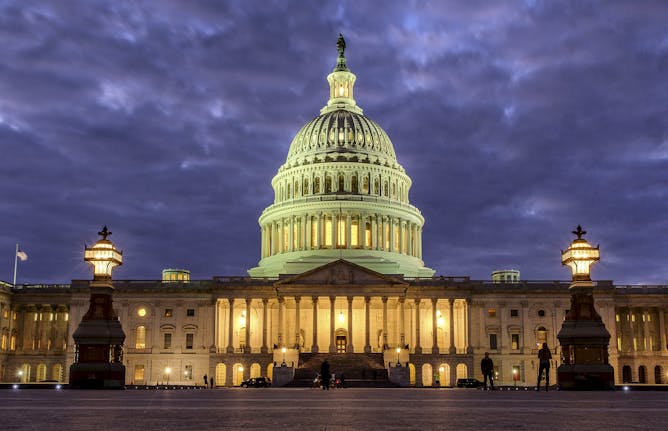|
This fall is the 10th anniversary of the horrific terrorism attack on the Taj Mahal Hotel that left 164 dead and hundreds more wounded. Today in The Conversation Canada, Joseph McQuade of the University of Toronto and Emily LeDuc of Queen’s University explore the story of the Mumbai attack and how it’s now a major feature film that just premiered at the Toronto International Film Festival.
Canadians aren’t paid for donating blood, but Vida Panitch of Carleton University and Chad Horne of Franklin & Marshall College explore a controversial new development where a private plasma company is offering gift cards to donors. The authors say it’s wrong for a private company to profit from the sale of Canadian blood products, but that doesn’t mean donors shouldn’t be compensated.
It’s been two weeks since the shocking court ruling that halted construction on the Trans Mountain pipeline extension. Mark Winfield from York University explains why any hopes of a quick and easy political solution to get the project back on track is very unlikely.
And finally…John Colarusso of McMaster University, who served as an adviser on Russia to the Clinton White House, takes a deep look at what might have been behind an unusual visit to Washington by top Russian intelligence officials earlier this year. Was it part of Vladimir Putin’s larger plan to cause chaos? Read on to find out!
|

‘Hotel Mumbai’ is a gripping film that provides a glimpse into the fear and brutality of terrorism but also the everyday bravery of its victims. Here Armie Hammer in ‘Hotel Mumbai.’
Courtesy of TIFF
Joseph McQuade, University of Toronto; Emily LeDuc, Queen's University, Ontario
'Hotel Mumbai,' which premiered at the Toronto International Film Festival, is an 'anthem of resistance;' a film that highlights the things ordinary people can do in extraordinary circumstances.
|

More than 80 per cent of the plasma Canada now uses for medical purposes comes from paid donation in the United States.
(Shutterstock)
Vida Panitch, Carleton University; L. Chad Horne, Franklin & Marshall College
Canada suffers a shortage of vital blood plasma. Paying donors, through a non-profit like Canadian Blood Services, would secure a local supply without lining the pockets of corporate shareholders.
|

People hold artwork of various marine life and youth during a rally celebrating a recent federal court ruling against the Kinder Morgan Trans Mountain pipeline expansion, in Vancouver, on Sept. 8, 2018.
(THE CANADIAN PRESS/Darryl Dyck)
Mark Winfield, York University, Canada
Contrary to what some have suggested, the uncertainty over the Trans Mountain pipeline expansion will be drawn out.
|

The U.S. Capitol is seen here in this January 2018 photo. Three top Russian intelligence officials met with their American counterparts in D.C. in January. Why?
(AP Photo)
John Colarusso, McMaster University
In January, three top Russian intelligence officials met with their peers in Washington, D.C. What was their goal amid the Robert Mueller investigation? An expert on Russia speculates.
|
Politics
|
-
David Titley, Pennsylvania State University
Don't believe the skeptics or the conspiracy theorists: Weather forecasters can't slant hurricane warnings to make political points.
|
|
Environment + Energy
|
-
Britta Denise Hardesty, CSIRO; Chris Wilcox, CSIRO; Kathy Ann Townsend, University of the Sunshine Coast; Qamar Schuyler, CSIRO
Autopsies of 1,000 turtles washed up on Australian beaches paint a grim picture of the impact of plastic debris. Even a single piece can be deadly, and on average 14 pieces equals a 50% fatality rate.
|
|
Health + Medicine
|
-
Jenna E. Gallegos, Colorado State University; Jean Peccoud, Colorado State University
Small-batch brewers are starting to tinker with biologic drugs to meet their own medical needs. A side effect of their success would be a disruption to how big pharma makes and distributes drugs.
|
|